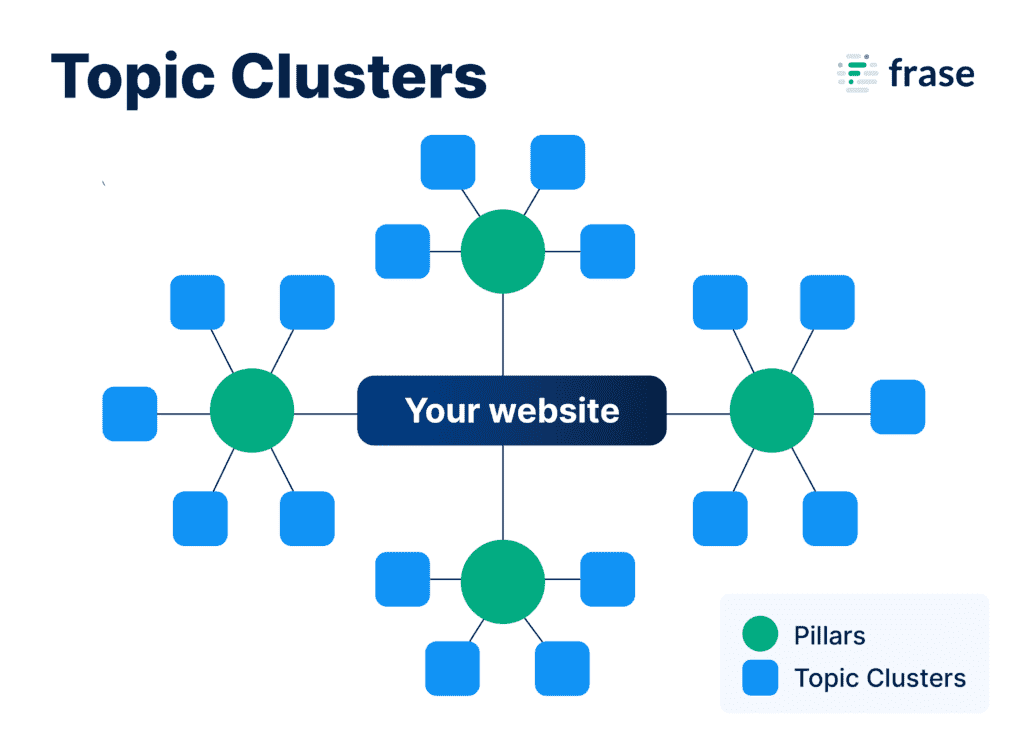What are Topic Clusters – The Next Evolution of SEO
Are you having trouble getting more people to visit your website? Have you heard of topic clusters but aren’t sure what are topic clusters or how they might help you rank higher in search engines? If so, you’ve landed on the correct page of the internet.
It’s critical to keep up with the newest trends and methods in today’s ever-changing world of search engine optimization (SEO). Topic clustering has shown to be one of the most effective tactics in recent years.
A topic cluster is essentially a collection of interconnected pages that all focus on a single primary theme or issue.
Topic clusters allow you to give more complete and structured material to your viewers while also improving the SEO of your website.
So, what is topic clustering and how can you use it on your website? Let us investigate more.
What Are Topic Clusters?
A topic cluster is, at its heart, a group of web pages that are all connected together by a central pillar page.
The pillar page provides an overview of the issue, introducing it and links to more extensive subtopics.
These subtopics may consist of a combination of shorter blog entries, lengthier articles, and other sorts of information.
Assume you run a website that gives information on healthy eating. Your main pillar page might emphasize the benefits of a healthy diet and connect to subtopics such as:
- Meal Planning Suggestions
- Recipes for nutritious meals
- Information on the health advantages of certain foods
- How to Read Food Labels Guides
Each of these subtopics should be connected back to the main page and, when appropriate, to each other.
This builds a network of linked material that allows readers to easily explore and discover the information they want.

Why Should You Use Topic Clusters?
There are various reasons why topic clusters might be a useful tactic to boost the SEO of your website. Here are the most important:
By arranging your material in this manner, you build topical relevance and indicate to search engines that your website delivers in-depth and authoritative information on a certain subject. This can dramatically increase the visibility of your website in relevant search results.
This improves user engagement, lowers bounce rates, and increases the possibility that visitors will stay on your site for longer periods of time.
You boost your chances of ranking better in search engine results pages (SERPs) for a larger variety of relevant keywords and phrases by constantly producing high-quality subject clusters.
You exhibit knowledge and expertise to both search engines and consumers by writing extensive and well-structured content that covers many elements of a certain issue. This can boost your target audience’s credibility, trust, and recognition.
As a consequence, your website may receive more organic traffic from a variety of sources, increasing exposure and possible conversions.
Implementing topic clusters allows you to modify your SEO approach to current best practices while also protecting your website from prospective algorithm changes.
Tips for Creating Effective Topic Clusters
Now that you’ve learned the fundamentals of subject clusters, here are some tips for establishing effective clusters on your own website:
- Select a wide, relevant topic: Your pillar page should focus on a topic that is important to your business or website and for which you want to rank in search results.
- Conduct keyword research: use tools such as Kwfinder to find similar keywords and phrases to include in your article.
- Create a pillar page: Your pillar page should include a thorough summary of the topic and include links to related subtopics.
- Create related subtopics: These pages should include more thorough information on various elements of the topic and, where appropriate, link back to the pillar page as well as to each other.
- Optimize your content: Make sure your material is high-quality, relevant, and search engine-friendly. To make it easier to read, use headers, bullet points, and other formatting strategies. You can utilize tools like SurferSEO to get Ai suggestions on how to improve your content.
- Keep it up to date: Finally, don’t forget to update your content on a regular basis. Keeping your content “fresh” makes you look more authoritative and up to date in big G’s eyes.

Bottom Line
To summarize, topic clusters are the next step in SEO progression and a very successful method for ranking high in search engine results pages.
You can keep readers interested and create more organic traffic to your website by developing well structured and authoritative content around a single subject and linking relevant pages with hyperlinks.
To be successful with topic clusters, you must first understand your audience’s search intent, then generate high-quality content that answers their queries, and then review your analytics and performance to fine-tune your strategy.
With these guidelines in mind, you may use subject clusters to increase the visibility of your website and attract more visitors.
More SEO Content:
ℹ️ This blog is reader-supported. When you buy through links on this site, I may earn an affiliate commission without any surcharge to you. This helps me continue offer free and quality content for the community.
